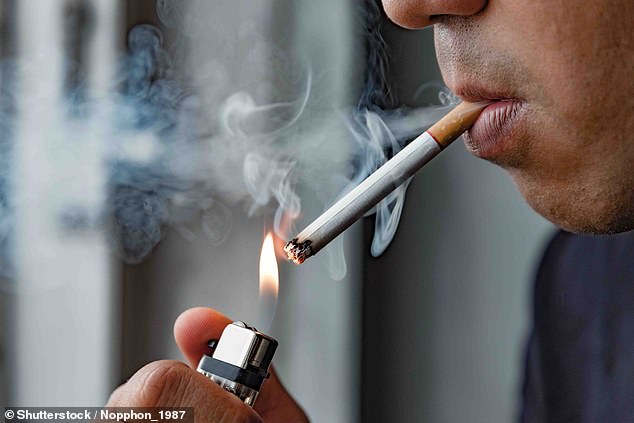Smokers and obese people are sent to the back of the NHS treatment queue if they fail to get in shape
Smokers and obese patients risk being pushed to the back of the queue for operations under government plans to cut waiting lists.
The move, unveiled by the Prime Minister yesterday, means only patients ‘deemed fit to proceed’ will be given a date for surgery.
According to the plans, tens of thousands of patients waiting for hip and knee surgery will first undergo a twelve-week weight loss program. Smokers will be urged to quit.
Research has long suggested that prehabilitation – physical, nutritional and psychological support before surgery – can reduce the risk of complications or cancellations.
The new government plan known as the ‘Elective Reform Plan’ also proposes that making patients fitter before treatment will increase the number of people suitable for day surgery, avoiding long hospital stays.
But experts have previously warned such moves are a ‘betrayal of NHS values’ and could ‘fuel’ health inequalities.
Figures show that an estimated 6.34 million people were on the NHS waiting list for 7.54 million treatments at the end of October.
Sir Keir pledged to diagnose and treat 92 per cent of patients within 18 weeks of receiving a GP referral by the end of this Parliament.
The move, unveiled by the Prime Minister yesterday, means only patients ‘deemed fit to proceed’ will be given a date for surgery.
Currently, only a third (35 percent) are seen within this time frame. The target has not been achieved for almost ten years now.
“If you stop smoking four weeks before surgery, patients have a 25 percent lower risk of respiratory complications and a 30 percent lower risk of wound healing complications than those who continue to smoke,” the plans say.
It is not yet clear which criteria patients must meet to be considered suitable for surgery.
It is expected that the decision will be made on a case-by-case basis. Those who are not considered fit enough will remain on the waiting list.
Professor Sir Stephen Powis, National Medical Director of the NHS, said: ‘The clinical view is that being fit and as prepared as possible for surgery can result in better post-operative outcomes and increase productivity, by reducing any complications associated with surgery to reduce.
‘So as part of the Elective Care Reform Plan, the NHS will do everything in its power to help patients prepare for treatment, including by offering the option of weight management support or help with quitting smoking, so they can start recovering even before treatment. starts.’
Currently, obese patients are advised by the NHS to reduce their surgery risks by losing weight, quitting smoking and controlling blood sugar levels.
But this has no consequences for the waiting list nationally.
Some local NHS trusts have previously been criticized for imposing restrictions on access to surgery, including asking obese patients to lose 10 percent of their body weight, and smokers to quit for at least two months.
This was thought to be against official guidelines.
Obesity itself increases the chance that a person will suffer from serious health problems that can damage the heart, such as high blood pressure, as well as cancer.
Around two in three adults in Britain are obese or overweight, giving the country one of the highest obesity rates in Europe.
Last year, a sobering report also suggested that rising obesity rates in Britain have led to a staggering 39 percent rise in type 2 diabetes among people under 40, with 168,000 Britons now living with the disease.
Gaining pounds has also been linked to at least thirteen types of cancer and is the second biggest cause of the disease in Britain, according to Cancer Research UK.
In June, a US study suggested that weight-loss shots could help obese patients have fewer complications after surgery.
However, experts warned that more research was needed before the shots were given the green light for such use.

According to the plans, tens of thousands of patients waiting for hip and knee surgery will first undergo a twelve-week weight loss program. Smokers will be urged to quit
The new elective care plans would see the NHS ‘reformed from top to bottom’, Sir Keir said yesterday.
He too promised to make ‘better use’ of the private sector so that sick Britons can be seen more quickly for a wider range of issues.
GPs will be forced to actively tell patients when they can have their scans, tests or operations in a private clinic.
Under the plan, up to half a million additional appointments are also expected to be made available each year through the extension of the opening hours of community diagnostic centers and the establishment of fourteen new surgical centers and the expansion of three in June.
Giving patients the choice to opt out of follow-up appointments that are currently booked as standard could free up up to a million appointments.
Wearable technology will also be used more widely to collect health data to reduce the number of routine appointments rather than out of clinical necessity.
The NHS trusts that can reduce waiting times fastest will be rewarded with more funding for local projects such as investment in new diagnostic equipment or maintenance of hospital wards.
Health Minister Wes Streeting said the aim of reducing maximum waiting times from 18 months to 18 weeks would be achieved by “bringing care closer to home and giving patients more choice about their treatment”.
But earlier this week he also warned that delivering on Labour’s pledge to restore the 18-week standard by the time of the next election will be a ‘big, tough challenge’.
The Health Secretary added that the NHS would “collapse” like the high street chain Woolworths unless it embraces reforms designed to drag the NHS into the 21st century.
